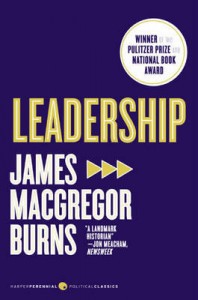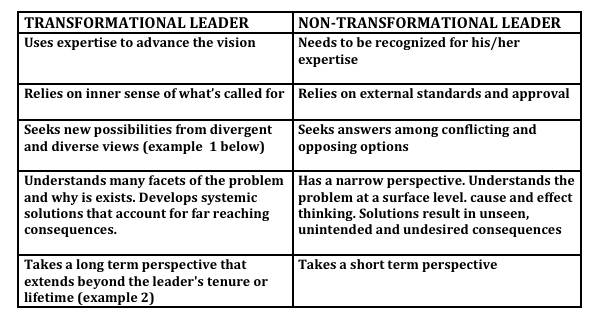TRANSFORMATIONAL LEADERSHIP – Off the beaten path
Professor James MacGregor Burns, presidential biographer and leadership expert, walked the usual path to his office in the political science building. On this day, however, he turned towards the psychology building, where he didn’t teach.

Why? He sought answers to questions about leadership.
Burns, the Grand Father of transformation leadership, defines it as a “Process of engaging with others in such a way as to raise leader and follower to higher levels of motivation and morality.” He contrasts this to,
“A false conception of leadership as mere command and control. As leadership comes properly to be seen as a process of leaders engaging and mobilizing human needs and aspirations of followers, women will be more readily recognized as leaders and men will change their own leadership styles.”
TRANSFORMATIONAL LEADERSHIP – The next phase
Following Burns’ path, business influencers and leadership theorists including Chris Argyris and Warren Bennis emphasize self-awareness. Leaders need to become conscious of hidden assumptions that govern how they think, what they think and what they do. But how do people develop this capacity for uncovering what usually remains below consciousness? They reach a more highly evolved stage of ego development, as defined by psychologist Jane Loevinger.
TRANSFORMATIONAL LEADERSHIP’S – Dirty Little Secret
Just as Burns thought, psychology is the dirty little secret that explains leadership. The best leaders are more psychologically evolved and therefor capable of:
- Transforming themselves, others, and the culture
- Taking people beyond the limits of what they thought possible
- Achieving higher levels of motivation and morality for self and others
- Creating new approaches based on different assumptions and mental models. (aka innovation)
- Leaving a positive legacy and foundation for future generations
Psychologically evolved leaders use their talents, and themselves, to achieve a vision. Less ego mature ?leaders? use the role to build their egos.
1. Abraham Lincoln bridges the divisive slavery issue
’They are just what we would be in their situation. If slavery did not now exist amongst them, they would not introduce it. If it did now exist amongst us, we should not instantly give it up…I surely will not blame them for not doing what I should not know how to do myself.’ “ Lincoln does not further polarize the sides by identifying one as good and the other as evil. Instead he attempts to bridge the divide with empathy.
2. Nelson Mandela, a vision beyond his lifetime
Nelson Mandela knew, in advance, that his actions would lead to many years of grueling imprisonment. He chose to act for the future of his people and on behalf of a more evolved morality for all people.
TRANSFORMATIONAL LEADERSHIP: Stages of Ego Development
The connection between the motivations and actions of transformational leaders are directly related to the stages of adult ego development, beginning with stage 5, below:
5. Self-Aware – recognizes an inner self separate from expectations and norms.
6. Conscientious – chooses own standards, expectations and goals; sees herself from others’ perspectives, motives – not just actions – are important.
7 Individualistic – sees self as distinct from his roles, subjective experience becomes increasingly important, has greater tolerance, psychological causes are explored and understood
8 Autonomous – sees polarities and complexities, integrates disparate ideas, tolerates ambiguity, motivated by self-fulfillment
9 Integrated – transcends conflicts and polarities, motivated to go beyond self gratification
Learn more about the transformational leadership assessment based on Loeveinger’s stages of adult ego development.


